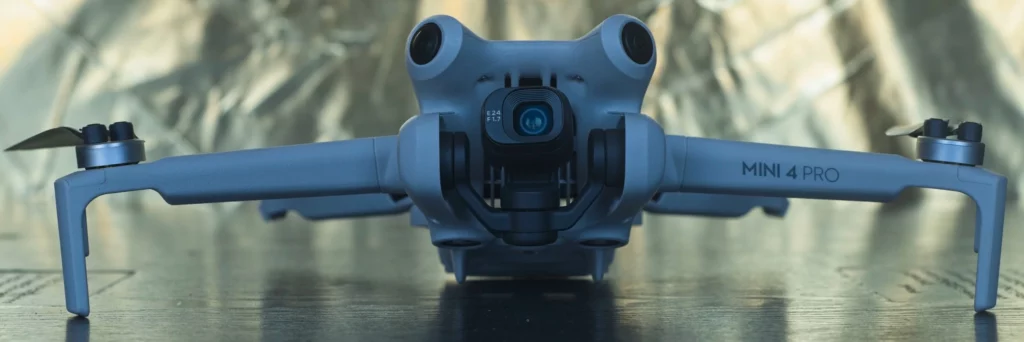The Mini 4 Pro has many new features for filming. With the new processing platform, video quality is excellent with more detail than the Mini 3 Pro, rich and well-balanced colors, good contrast, and excellent structure of the sky. Thanks to the wide aperture, low-light footage is outstanding
In this video, I will analyze the quality of the footage of the Mini 4 Pro in all different light conditions and with the three color profiles
You can check the prices for the different configurations of the Mini 4 Pro through the button below (commission earned)
Other related articles about the Mini 4 Pro:
- Photography Review
- Camera setting for video
- Mini 4 Pro vs Mini 3 Pro video quality
- Exposure settings for video and photos
- Active Track 360 (new version named Active Shots)
- Waypoints mode
- Point of Interest mode
- Spotlight mode
- Mastershots
- Quickshots
If you prefer to watch it as a video, you will find my YouTube version at the end of the article
Video Specs
| Sensor size | 1/1.3″ |
| Field of view | 24mm |
| Aperture | f1.7 |
| Max video resolution | 4k |
| Max frame rate | 100 fps at 4k |
| Max bitrate | 150 Mbps |
The specs of the sensors are the same as the Mini 3 Pro and the wide-angle lens of the Air 3, but is it the same sensor?

I have seen plenty of discussions online about it. DJI has never specified the nature of the sensors, but apparently, the Mini 4 Pro and the Air 3 have a stacked one
If we assume the sensor of the Mini 3 Pro to be the same, which I cannot state for sure, any difference in video quality is due to the new image processing platform
Video Features
The latest lightweight model includes a host of compelling features for filming, some of them previously reserved for the flagship models, like omnidirectional obstacle sensors and the very useful Waypoint Mode
Other important new functionalities are a much-improved transmission system, which is the weak point of the Mini 3 Pro, and a longer battery life
Tips for Cinematic Footage
To get the best footage quality out of the Mini 3 Pro, or any other drone, it is crucial to choose the correct light conditions
The central hours of a sunny day are to be avoided, as the shadow will be very harsh. This is the time when videographers are supposed to sleep
Much better results are obtained around sunrise or sunset or with the sun covered by clouds
In general, it is preferable to have the sun behind the camera. Shooting in the direction of the sun is much more challenging and should only be attempted around sunrise or sunset
It is also crucial to use Manual Exposure and White Balance to avoid shifts of luminosity and color during a clip. With the Mini 4 Pro in most light conditions, I select a WB value just above 5500 Kelvins
Easy Light Conditions
Let’s start with some friendly night conditions to see how the Mini 4 Pro behaves in the three color profiles
Normal
Normal is the most widely used as it only needs limited editing or none at all, it is the ideal profile for quickly posting footage on social media and the one to choose for beginners
In previous models of the DJI prosumer line Normal mode needed an extra dose of contrast and saturation to shine. This is not the case with the Mini 4 Pro, as the footage is excellent right out of the camera
The quality of the footage in easy light conditions is outstanding: the colors are rich and well-balanced, there is good contrast, and the structure of the sky is a thing of beauty
A relatively weak point of footage in the Mini 3 Pro is the amount of detail, especially in elements quite far away. With the new model, there is plenty of detail on all occasions. The new processing algorithm does an excellent job
8-bit vs 10-bit
I can hear someone asking: if Normal is so good, what is the point of the two other color profiles?
Normal is an 8-bit profile, capable of recording around 16 ml colors vs over 1bl for 10-bit ones
The limited amount of colors may introduce some artifacts like color banding in uniform areas like the sky or the sea, especially when heavy color grading is applied
Also, this profile is heavily pre-processed, so it does not respond very well to color grading, in other words, it is sort of half-baked
On most occasions, noise is under control. But I am not worried about it, as I use the excellent denoiser Neat Video
Here you find my article about Neat Video. You will find more info including the price through the button below
D-Log M
Any time we need to heavily modify the footage to match a specific mood or the color scheme of a specific project, D-Log M is the one to use
D-Log M is a softer version of the widely used D-Log, which is supplied with the Mavic 3. It is a flat profile, although not as flat as D-Log
The idea behind a flat profile is to reduce the contrast by lowering the brightness of the highlight and the darkness of the shadows to increase the performance in high dynamic range situations
The highlights and shadows will be adjusted in post-processing
When using this profile the image on the screen will appear quite flat, making it hard to frame and expose correctly, but in DJI Fly app we can turn on the option Color Display Assist to improve the visualization
D-Log M footage requires the use of LUTs for color grading: DJI supplies a specific one for the Mini 4 Pro. It can be downloaded for free from DJI’s website
The results obtained under easy light conditions are excellent, but the strong point of D-Log M is that it responds extremely well to color grading, so it is the profile to use for expert users who are willing to post-process their clips on a computer
HLG
The mini 4 Pro has a third color profile, HLG
It is a 10-bit one and is meant to be used with high-definition display units, like a few recent TVs. It can be used on regular display units, but it is more complex to post-process and requires a specific color space
I have described how to integrate HLG into a timeline containing other color profiles in my article about the color profiles of the Mini 4 Pro
Top-Down Footage
By turning the camera down for bird’s eye views we take the sky out of the equation to concentrate on the excellent detail and the wonderful color rendition of the camera of the Mini 4 Pro
In the Camera tab of Settings, there is a Stlyle function with an option to fine-tune the Sharpness. In my opinion, there is no need to increase the Sharpness, some users might rather want to decrease it slightly, according to their taste
Towards the Sun
The hardest test for a video camera is filming in the direction of the sun, as the dynamic range is extreme
With the sun just outside the frame about an hour before sunset, the Mini 4 Pro performs very well
The footage retains plenty of contrast and information in the shadows. The structure of the sky is excellent with both profiles, D-Log M and Normal
Even with the sun inside the frame at sunset, the performance is outstanding
I decided to push it to the limit by trying a shot toward the sun an hour before sunset and here things don’t go as well: the sky is overblown, there are horrible flares and loss of resolution and detail around the sun. There is also an annoying small green dot at a specific angle to the sun
But in this light situation, even the mighty Mavic 3 would have a hard time
The Mini 4 Pro performs extremely well in low light, but I will not analyze this topic here, as I have done a specific video about low light and Night Mode with the Mini 4 Pro
